Happy
Blog-iversary to me! Yes, dear readers,
precisely one year ago today, I posted my first review (The Great Escape) over
here at blogger, after finally deciding to take the plunge and move from
Livejournal. Since then, I’ve posted over
200 film reviews and gotten to know some great fellow movie fans. I really appreciate all of you out there
whose awesome stuff I look forward to reading every day.
 |
| Yes, this is just a blatant excuse to use a Sherlock gif. |
For
those keeping tabs, I just saw my 901st film from the 1001 Movies
list, so I’m making slow progress there, but frankly, I’m more concerned with closing
the extraordinarily wide gap between films I’ve seen and films I’ve
reviewed.
So
today, in celebration of one year at this site, I bring you a review for an
extremely special film to me. I was
saving this one for a special occasion; today seems fitting.
The
Seventh Seal
1957
Director: Ingmar Bergman
Starring: Max von Sydow, Gunnar
Björnstrand, Bengt Ekerot, Nils Poppe, Bibi Andersson
I
know that I can tend towards over-adulation.
I know I am not shy in dealing out perfect scores for films. I know that I often say “this is one of my
favorite films ever!” I’m not ashamed of
this fact; it just means I love movies, and I love a lot of movies. But with The Seventh Seal, I have to add a
new level to “love.” This film… this is
in my top three ever. I highly doubt it
will be toppled. I love a lot of movies,
but even amongst the best and my other favorites, The Seventh Seal stands
out.
The
knight Antonius Block (von Sydow), accompanied by his squire Jöns
(Björnstrand), has returned to Sweden from the Crusades in the 14th
century only to find the land riddled with the black plague. Death (Ekerot), however, immediately calls on
Block to whisk him away, but Block insists on playing chess with Death for his
very life. This gives Block a stall and
he travels the land in search of God, trying desperately to find answers to the
very questions of his soul before Death carts him off for good.
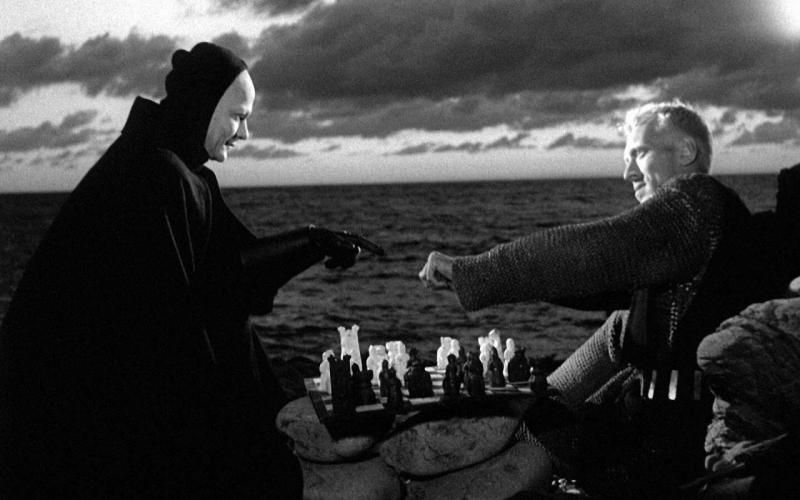 |
| I mean honestly... how much more famous a cinematic image can you get... |
An
expectation I always have with Bergman is downright stunning photography. This film is no exception, and Bergman
doesn’t ease us into it, either: we open the film with a fantastic shot of
clouds in the sky, then head straight into the definition-of-iconic chess scene
on the beach. The play of light is
gorgeous. Bergman is so smart in terms
of where the camera is pointing, always keenly aware of light sources. I think The Seventh Seal is more about light
than shadow, meaning the focus was not on the lack of light, but in its
strategic placement. The scenes in the
chapel with Antonius and Death are dark, yes, but we see the profiles of the
characters in bright, almost frightening white.
Then there is the sun-drenched scene where Antonius picnics with Jof
(Poppe) and Mia (Andersson), travelling actors who parallel Antonius’ journey
but only occasionally intersect their lives with his. And then, of course, there are the two most
famous shots (besides the chess game on the beach). When a character finally meets his death
after suffering loud and painful death throes, he is still and silent… and
then, to my amazement, the sun slowly breaks through the clouds and the scene
is awash in glorious light. Granted,
this was no plan of Bergman’s, and he has admitted he lucked into it, but he
was smart enough to keep the camera rolling that few extra seconds. The final shot of the film, of the players
being lead away by Death across the hilltop, was also an example of luck. All the main actors had packed up for the
day, but Bergman saw a gorgeous cloud formation on the horizon that he knew he
just had to use, so he quickly threw some of his staff into costume and they
ran up the hill. The shot is everything
that cinematic perfection strives for: the gray-white of the clouds, the black
of the people, the stark outline, the contrast, the beauty… I love the
photography of this film, and I’ve only mentioned the most famous shots. The rest of it is just as good. I can’t get enough.
The
Seventh Seal
takes existential angst to its zenith.
This movie is about nothing less than questions of God, of faith, of
humanity’s purpose on the earth. Bergman
explores these questions through so many different vehicles, and constantly throughout
the entire movie. There is not a scene
in the film that is not, either directly or indirectly, addressing some sort of
heavy philosophical question. This could
get incredibly tiresome, as these are not easy questions Bergman is
asking. Instead, then, he is smart about
it, and deals with the questions in a myriad of ways. Antonius Block is the most obvious mouth for
the questions, but his squire Jöns is just as much a mouthpiece as Block. There is a distinct difference, however,
between these gentlemen, as if two sides of Bergman’s soul are warring
onscreen. If Block is despairing yet
hopeful (at the same time, I know, this is an angsty movie), then Jöns is
cynical, resigned, and practical. They
are such important counterpoints to one another. Despite Block’s despair, he is still
searching, still hopeful he will find an answer. Jöns knows there IS no answer. Jöns does not see the point in searching at
all. This is an important difference,
and one that informs their various responses to situations. Block’s quest for spiritual fulfillment would
feel too pretentious if it was all we encountered, and Jöns’ cynicism would
have us reaching for the razorblades if we honestly thought there was no
hope. I love the pairing of the two of
them. They are such an unlikely yet
perfectly suited team to discuss questions of deep philosophy. I see these two characters as two sides of
Bergman’s soul. Bergman famously
struggled with issues of religion and belief in a deity throughout his life,
stemming in no small part from a tyrannical Lutheran preacher father who
habitually mistreated him. I think that
Bergman is both Block, searching desperately for signs that God is here on
earth yet holding out little hope, and Jöns, cynical and pragmatic.
Antonius
and Jöns are all about existential angst, but alongside them, there is Jof and
Mia, whose presence in the film is just as important. It’s no coincidence that the English
translation of their names are “Joseph” and “Mary,” and that they have a
toddler son. Jof and Mia, to me, clearly
represent Bergman’s belief that God is present on earth, perhaps in unlikely
places, perhaps even in the lives of traveling minstrels, but there
nonetheless. The scene where Antonius
encounters Jof and Mia on the hillside and eats strawberries with them
practically brings tears to my eyes. The
knight has an hour of peace, an hour of happiness that gives him a respite from
the quest that is torturing his soul. If
only he could realize that the answers to his questions could perhaps be found
with the simple life of Jof and Mia…
And
then there’s the downright dread of the character of Death. It’s hugely important that Bergman decided to
make the character “Death” instead of “The Devil.” The Devil implies specificity to a certain
religion; indeed, it implies existence of a god, because we cannot have the
devil without having God to counteract him.
But Death… Death is not tied to any religion. Death does not imply the existence of an
afterlife. Death does not confirm the
existence of any deity. Death is
universal. Death is blank. Death comes to all, regardless of
belief. This is Death who comes for
Block, not the devil, and Death is incapable of answering any questions about
the afterlife as Death does not care.
Ekerot does not have to exert much effort to convincingly make Death
frightening (the shaved eyebrows and wardrobe do most of the work), but I still
think his portrayal of Death unnerving.
He’s so human yet so forbidding all at once. In the chapel sequence, I was fooled my first
time watching the film by Death’s disguise, and I literally jumped up in my
seat when I realized it was him.
While
Bergman may be searching for the existence of God, there is no doubt in my mind
that he knows he won’t find it through organized religion. The Seventh Seal is a vehement
condemnation of the evils of religion if ever there was one. Block’s search for faith is entirely
different from a search for church.
Church and faith are not inextricably linked, which is not at all what
the Church would have you believe. The
Church, in The Seventh Seal, comes across as a peddler of guilt and blame,
convincing innocents they are to blame for the plague, selling them on notions
of self-flagellation as a means to “save themselves.” In fact, the most frightening scene of the
film to me is when the train of monks comes to town, interrupting Jos and Mia’s
happy little show. The horror of the
brainwashing these monks have inflicted on their stupid followers is beyond
belief. And frankly, Bergman isn’t
wrong. This portrayal of the Church, in
fact, seems pretty spot on to me. I have
rejected organized religion in my life, but I have not rejected the notion of
deism. In that way, I feel a profound
emotional connection to Bergman. He and
I think very similarly about these issues.
All
of this, everything I’ve said thus far, indicates an intellectual connection to
the film, which is all well and good but not enough to warrant a “Top Three”
ranking which I alluded to earlier. So
now, dear readers, the story of “The First Time Siobhan Watched The
Seventh Seal.”
I
admit I was nervous. Bergman carries a
certain weight, a certain expectation of pretension and difficulty, (and while
I will admit he can get a bit pretentious, I do not think he is difficult) and The
Seventh Seal has an enormous reputation. There’s a difference between watching “just
another movie” and a movie you KNOW graces nearly every Best Of list ever
made. So yeah, I was nervous. Nervous I wouldn’t get it, nervous I wouldn’t
like it.
I
needn’t have been.
(oh
god, I’m now watching the scene where Block looks into the eyes of the young
girl accused of being a witch… crap, this movie is killing me, it’s so amazing…)
There
is an unexpected sense of tension in this film.
It almost played out as a thriller to me the first time I saw it, what
with Block’s match with Death and its utter inevitability. I remember pausing the film about thirty
minutes in for some reason, and I realized I had been tensing my entire body
while watching it. In fact, I was hardly
drawing breath. Such is this movie’s
powerful effect. It’s not a thriller in
any kind of typical sense, but more a philosophical thriller, a hypnotic film
that was utterly engrossing.
In
fact, after I finished watching it for the first time, I turned off the
television and then just sat. Alone, by
myself, in the room, silently thinking about what I had seen.
Five
minutes later, I started to weep. I
started to weep, and I couldn’t stop weeping for twenty minutes. Not crying, either. Weeping.
Wracking sobs. Uncontrollable
crying. I couldn’t get a grip on myself
for twenty full minutes.
That
was unexpected.
The
Seventh Seal
is not a “sad” film. I’d hesitate
calling it a tragedy. But I have rarely
wept at a film the way I did with this one.
Which naturally begs the question of “why?” Why, if this movie isn’t all that sad, did it
make me cry? It really shouldn’t
have. I mean, there are some character
deaths in the film, but given that Death has a persona and this is set during
the outbreak of the black plague, this isn’t a surprise.
I
wasn’t weeping because I was sad.
I
was weeping because I had been profoundly emotionally and spiritually moved by
a film, and the only possible physical response was tears. I was not sad, I was not upset. The Seventh Seal had touched me,
spoken to me in a part of my soul that few (if any) other films had even gotten
close to, and it had made me think about the Big Questions. It had found the sensitive part of me, a part
buried under layers and layers of exterior walls. I was not the same person I was when I
started watching it. It had changed me.
Weeping
felt natural.
No
other movie has ever, EVER had this kind of spiritual effect on me. There are movies I love because they make me
sad, movies I love because they make me happy, and movies I love because they
take me on grand adventures. But The
Seventh Seal is an entirely different beast. That a movie, a MOVIE, could make me think
more honestly about God and faith than years in Sunday school and church
services ever could is something amazing.
To
this day, this film still brings tears to my eyes. Let alone the fact that it’s an astonishingly
good piece of cinema from a technical standpoint, its message of the quest for
spirituality still resonates profoundly for me.
I can’t watch this without getting caught up in Block’s hopeful
frustration.
It’s
just… It’s art. This is not film. This is art.
This is more. This… this “movie.” Too many feels, in the immortal words of my
friend Angie.
Perhaps
you can see why I say it would take quite a lot for a film to ever knock this
one out of its Top Three ranking for me, because this movie has meant quite a
lot to me beyond its sheer entertainment value.
Arbitrary
Rating: 10/10 with a special note that if I was allowing for bonus points, this
film would have earned them. And it
started my love affair with Bergman. He
and I, man… he is a director who speaks to me.
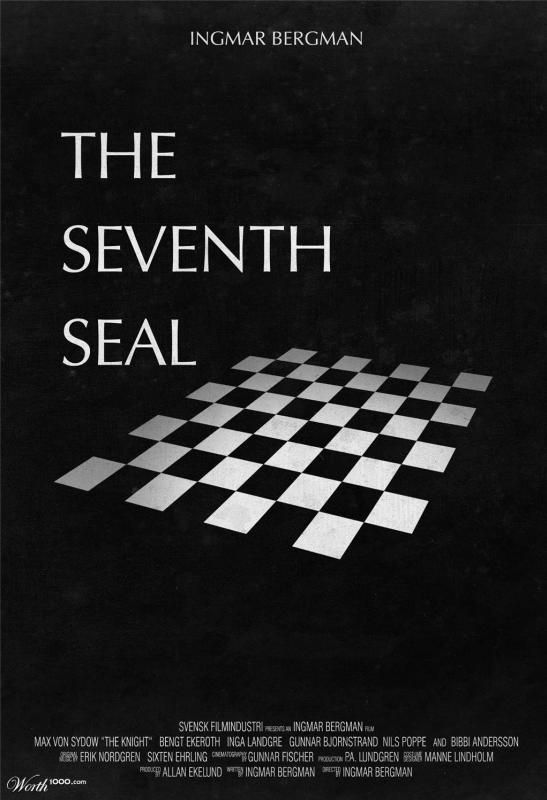
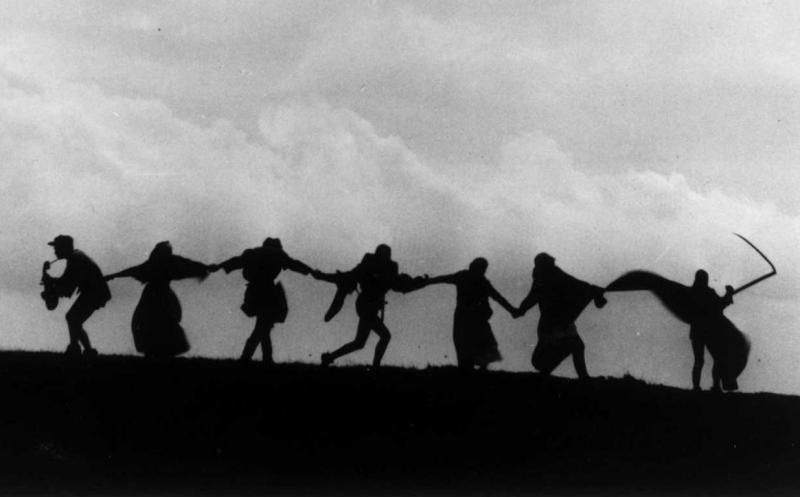
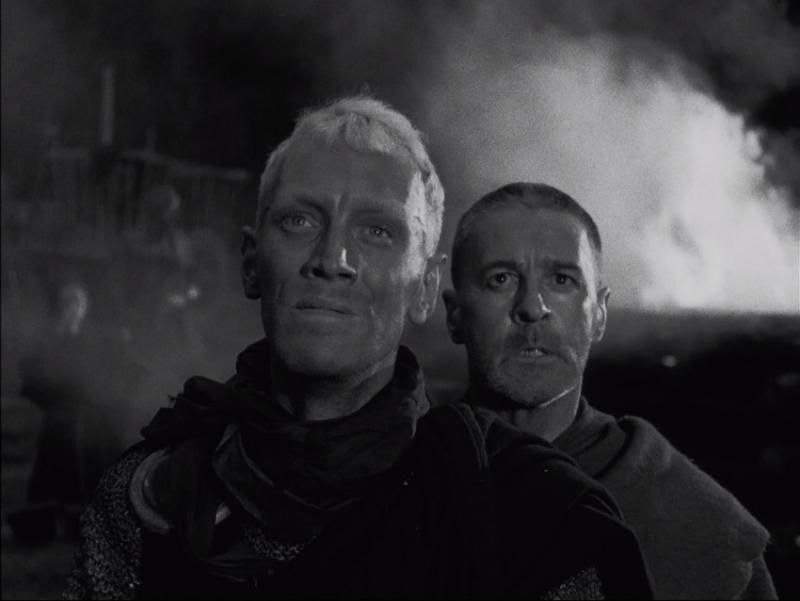
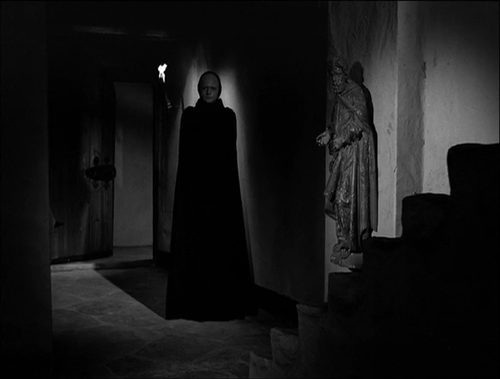
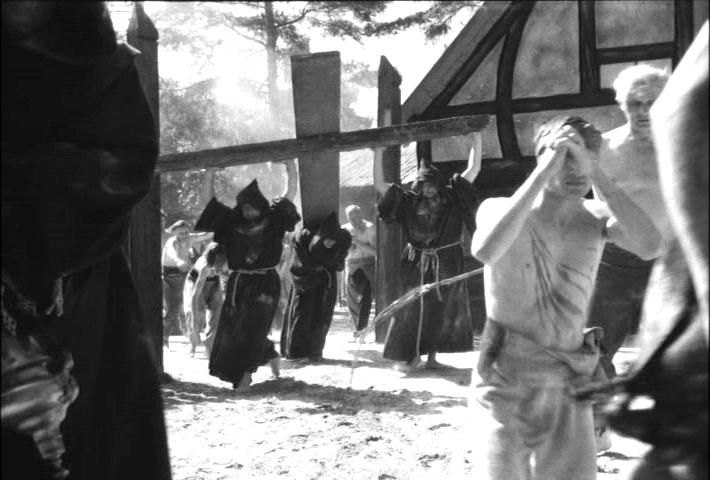
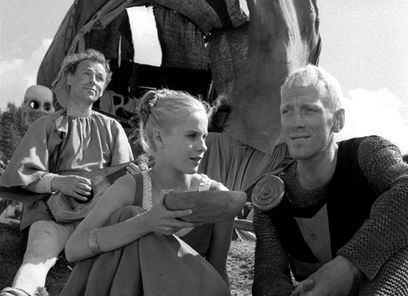
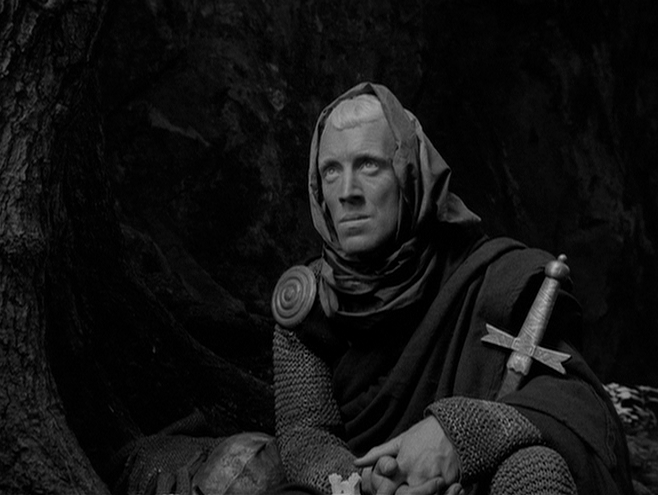
Congratulations on your anniversary. Your love for this film comes through quite clearly. It does beg the question of what the other two films in your top 3 are, though.
ReplyDeleteWell, I'll tell you one of them because I've already posted a review of it here, and that's A Clockwork Orange. But for the third, I'll hold off until I get around to writing about it. And I'll add that they aren't ranked. I can't. It's too hard. I think about my favorite films in not a ranked order, but more tiered levels. Tier 1, Tier 2, Tier 3. Someday I'll probably do a post about that.
DeleteGonna make me guess, huh? So let's see, based on your approximate age, gender, race, and socio-economic background, conditions would have been ripe for you to to go all gooey over a romantic movie and/or cute guy right around the time this film came out. My guess is.....The Cutting Edge (1992).
DeleteEither that, or Encino Man (1992).
:-)
Um.
DeleteNo.
(Although I do have a soft spot for The Cutting Edge... toe pick!)
Happy blog anniversary!
ReplyDeleteThank you!!!
DeleteAnd a happy anniversary from me too. You know, mine is coming up too very soon as well. We should do a party together :-)
ReplyDeleteI am full of admiration for your achievement, particularly because your reveiws are always so well written and so personal that I always enjoy reading them. Thank you very much for that. It is always a struggle to keep from reading them until I have at least seen the film myself and I do not always succeed. This time however I will wait because I really want to see The Seventh Seal with no prejudices.
Although our tastes in films sometimes differ I can always see why you like or dislike a movie and I respect that immensely. Good work and good luck with your future writing. Thumbs up from here.
Thank you very much for you very kind words! I really put some effort into the pieces that I write. It's kind of amazing to look at the library of reviews I've managed to amass in one year's time.
DeleteYes, I remembered that you started your blog right around the same time I did. Good for you for keeping it up as well!
Congrats on the 901st! I am simply in awe.
ReplyDelete- Sunny D
Thanks! Granted, I've been watching these movies since 2006, so I would hope to be fairly far along! The new challenge is definitely writing about them.
Deleteyeezy boost 500
ReplyDeletekyrie 4 shoes
yeezy boost 350
balenciaga
yeezy boost 350 v2
jordan 11
moncler jackets
kd 12
air max 90
air jordan